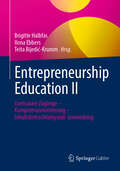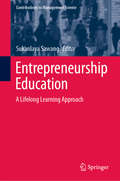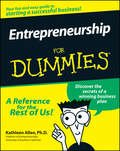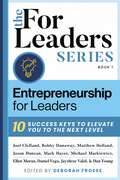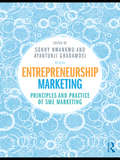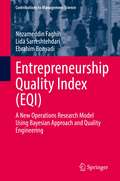- Table View
- List View
Entrepreneurship Development in India (Routledge Focus on Business and Management)
by Chanchal Dey Debasish BiswasEntrepreneurship development is a major area of focus today as it has huge potential in creating jobs and self-employability and thus contributing to economic development. India, in the last few years in particular, has seen exponential growth of start-ups and new-age entrepreneurs. Both the Central and State Governments have been taking proactive steps towards the development of entrepreneurship in the country. The Government has launched various schemes and programmes to attract investors and create a healthy ecosystem for entrepreneurship. India is one of the largest homes of start-ups in the world and has been highly successful in bringing significant amounts of Foreign Direct Investment (FDI). Moreover, the Government is taking active steps in removal of the bureaucratic hurdles and bottlenecks, so that entrepreneurship development is encouraged. In order to promote the culture of entrepreneurship development, the subject has been made part of the curriculum at both undergraduate and postgraduate levels across disciplines. This book is a sincere attempt to build the fundamentals of the subject amongst students alongside motivating them to become future entrepreneurs. It will be of interest to researchers, academics, and students in the fields of business administration, management, and entrepreneurship.
Entrepreneurship Ecosystem in the Middle East and North Africa: Dynamics in Trends, Policy and Business Environment (Contributions to Management Science)
by Nezameddin Faghih Mohammad Reza ZaliThis contributed volume explores and reveals the dynamics, strengths and weaknesses, trends and implications of entrepreneurship in the Middle East and North Africa (MENA) region. Presenting papers by respected experts in the field, it shares essential insights on the status quo of entrepreneurship and the opportunities and threats it faces in the MENA region. Topics range from development of entrepreneurial universities to international entrepreneurship, as well as emergent topics such as green entrepreneurship, sustainable entrepreneurship and youth entrepreneurship.
Entrepreneurship Education
by Mathew J. Manimala Princy ThomasThe book provides an overview of developments in the field of entrepreneurship education, with special reference to global perspectives on innovations and best practices, as well as research in the emerging economy context. It focuses on various experiments in curriculum design, review and reform in addition to the innovative processes adopted for developing new content for entrepreneurship courses, in many cases with an assessment of their impact on students' entrepreneurial performance. Further, it discusses the pedagogical methods introduced by teachers and trainers to enhance the effectiveness of students' learning and their development as future entrepreneurs. It explains the various initiatives generally undertaken to broaden the scope of entrepreneurship education by extending it beyond regular students and offering it to other groups such as professionals, technicians, artisans, war veterans, and the unemployed. The book is a valuable resource for researchers and academics working in the field of entrepreneurship education as well as for trainers, consultants, mentors and policy makers.
Entrepreneurship Education II: Curriculare Zugänge – Kompetenzorientierung – Inhaltsbetrachtung und -anwendung
by Ilona Ebbers Brigitte Halbfas Teita Bijedić-KrummDas Herausgeberwerk adressiert theoretisch fundiert ein breites Spektrum didaktischer Faktoren einer Entrepreneurship Education im Kontext Ökonomischer Bildung. Neben lehrplananalytischen Zugängen, Beiträgen zu Kompetenzorientierung und Lernzielbestimmung finden sich kritische Auseinandersetzungen mit ausgewählten Inhalten der Entrepreneurship Education. Im Weiteren werden didaktische Gegenstände analysiert und ihre Umsetzungspotentiale ausgelotet.
Entrepreneurship Education and Internationalisation: Cases, Collaborations and Contexts (ISSN)
by Denis Hyams-Ssekasi Robert James CrammondEntrepreneurship Education and Internationalisation: Cases, Collaborations and Contexts provides a wide-ranging overview of entrepreneurship education today from a global perspective. Comprising three parts that address teaching and learning, support and outcomes, and strategic themes, international educators and researchers present examples of entrepreneurship education in action within many contexts. Chapters discuss across many academic fields and taught disciplines, involving many industry stakeholders concerning enterprise and business creation and development, and acknowledge policy and policymakers within local, national, and international government or educational forums.Chapters showcased within this edited book range from collaborative teaching case studies, course teaching styles and assessment strategies, and display links with national or international industry partners. Furthermore, incubation opportunities, examples of accelerator and university start-ups or spinouts, cross-continent partnerships for entrepreneurship, and other relevant enterprising activity between universities and industry or societal groups are also examined and appreciated.
Entrepreneurship Education and Research in the Middle East and North Africa: Perspectives on Trends, Policy and Educational Environment (Contributions to Management Science)
by Nezameddin Faghih Mohammad Reza ZaliThis contributed volume explores and reveals the new developments, dynamics and recommendations for entrepreneurship education in the Middle East and North Africa (MENA) region. Presenting papers by respected experts in the field, it shares essential insights on the status quo of entrepreneurial education and training programs, the characteristics and motivations of early stage entrepreneurs, and the regional framework conditions in MENA. The book closes with a bibliometric perspective on the trends in the entrepreneurship research and education being developed in MENA.
Entrepreneurship Education and Training: The Issue of Effectiveness (Routledge Advances In Management And Business Studies)
by Frances Hill Claire Leitch Colette HenryThis title was first published in 2003. The book covers the areas of: entrepreneurship and economic development; entrepreneurship theories (traditional and alternative); entrepreneurship education and training programmes; a comparative European analysis of entrepreneurship programmes; a profile of the aspiring entrepreneur; assessing effectiveness; and a framework for the design and development of entrepreneurship training programmes. Readers should gain a significant insight into the effectiveness of entrepreneurship training programmes from both the programme providers' and participants' point of view. Key features of the book include: an up-to-date review of the literature in this field; a comparative analysis of entrepreneurship programmes with a European perspective; an in-depth treatment of the effectiveness issue both on a qualitative and quantitative basis, and a longitudinal study involving a control and comparator group. The framework proposed by the authors should be applicable on a European scale.
Entrepreneurship Education at Universities
by David B. Audretsch Christine K. VolkmannThis volume discusses entrepreneurship education in Europe on the basis of in-depth case studies of related activities at twenty higher education institutions. Based on a model of entrepreneurship education, the analysis addresses curricular and extra-curricular teaching, as well as the institutional and stakeholder context of delivering entrepreneurship education within higher educational institutions. The book offers both insightful entrepreneurship teaching practices and a discussion of potential organizational drivers and barriers. Accordingly, it provides a valuable resource for researchers, instructors, and managers of entrepreneurship education alike.
Entrepreneurship Education: A Lifelong Learning Approach (Contributions to Management Science)
by Sukanlaya SawangThis book explores how entrepreneurship education can be embedded throughout the learner’s lifetime. To date, entrepreneurship education has tended to begin on an ad hoc basis at the higher education level: some institutions offer it as an elective or compulsory course, while others offer it as a degree program. In most countries, entrepreneurship has not yet been widely adopted in the core curriculum, and formal entrepreneurship education is almost exclusively offered to young learners. In addition to presenting critical views on who can benefit from entrepreneurship education, including children/schoolchildren, students in higher education and older people, the book proposes a model of holistic entrepreneurship education to promote a lifelong learning journey for educators and learners alike.
Entrepreneurship Education: Begriff - Theorie - Verständnis
by Ilona Ebbers Teita Bijedić Brigitte HalbfasDas Herausgeberwerk vermittelt theoretisch fundiert die Entrepreneurship Education aus pädagogisch-didaktischer Sicht und bettet sie in den Kontext ökonomischer Bildung ein. Thematisiert werden Begriffsverständnisse und Definitionen einer Entrepreneurship Education, ihre disziplinäre und theoretische Einordnung ebenso wie ihre didaktische Fundierung und thematische Ausdifferenzierung.
Entrepreneurship Education: Scholarly Progress and Future Challenges (Routledge Focus on Business and Management)
by Gustav Hägg Agnieszka KurczewskaThe discussion around whether entrepreneurship can be taught is becoming obsolete as the number of entrepreneurship courses, specializations and degrees is rising at an unprecedented rate all over the world and the demand for entrepreneurial education teachers or instructors is constantly growing. The global community of entrepreneurial education proponents is enthusiastic about the possibility of spreading the idea of entrepreneurship, as it is believed to benefit societies and economies in addition to influencing human development on an individual level. The fervour is nurtured by public policies and the development of an enterprising culture in the public discourse. In this discourse, entrepreneurship is treated as a panacea for numerous social and economic problems. This book is a solid reference point for all who are interested in conducting research on entrepreneurial education or engaged in teaching entrepreneurship. It is a compendium of knowledge about entrepreneurial education as a research field, seen from the perspective of the last four decades, its complete contemporary history. It reviews the progress of the field from the outset to the present in terms of its socio-economic context, changes in the academic community, but also its research focus and methodological development. This uniquely comprehensive book is a resource of both knowledge on entrepreneurial education research and inspiration for future studies within the field. This timely and relevant book provides practical insights for educators when developing their teaching practice and will be of interest to entrepreneurship educators and entrepreneurship education researchers.
Entrepreneurship For Dummies
by Kathleen AllenThe perfect resource for your journey to start a business Entrepreneurship For Dummies is the essential guide to becoming your own boss and a successful entrepreneur. We make it simple to learn every step of the process. Identify an opportunity, learn your customers’ needs, test your product, protect your intellectual property, secure funding, and get ready for that all-important launch. In classic Dummies style, this book is packed with practical information and useful advice, all in a fun and easy-to-follow format. Take fear out of the entrepreneurship equation and build the confidence you need to make your fantastic business idea take flight. Get up to date on the latest lingo, new ideas for raising money, and the latest ways to do business in the digital age. Understand the process of starting a business, from beginning to end Complete the necessary planning and meet legal requirements, without the headache Get expert tips and tricks on funding your idea and bringing your product or service to market Build the foundation you need to keep your business thriving and growingEntrepreneurship For Dummies supports you as you travel along the road to success.
Entrepreneurship For Dummies (For Dummies Ser.)
by Kathleen AllenToday's business marketplace is filled with news of small business and entrepreneurs making it big. Entrepreneurship For Dummies brings everything the reader needs to get started in business into one package. From developing an opportunity and coming up with a concept to actually creating the company, this book guides readers step-by-step. Included are all the procedures necessary to create a successful business. Learn how to know your customer, test and protect your product, test distribution, and create a business plan. Discover how to find the best legal structure, business model, organization plan, marketing plan, and financial plan.
Entrepreneurship For Leaders: 10 Success Keys To Elevate You To The Next Level (For Leaders Series)
by Young Hayes Duncan Holland Clelland Dunaway Markiewicz Moran Vega VakilWhat does it actually take to become an entrepreneur? In this first book of the For Leaders Series from Indigo River Publishing, ten successful serial entrepreneurs share their perspectives of risk-taking and business building. From crushing fear to creating global impact, this book will give you insights and tools for your journey.Entrepreneurship For Leaders features a dynamic range of contributors: Joel Clelland, Bobby Dunaway, Jason Duncan, Mark Hayes, Matthew Holland, Michael Markiewicz, Ellen Moran, Daniel Vega, Jayshree Vakil and Dan Young. With more than several dozen start-ups between them, they address common experiences and essential skills: Learn when and how to delegate. Discover the right kind of passion to drive success. Understand the factors that distinguish entrepreneurs from employees. Capitalize on the leadership styles of your team members. Position your business for the best tax advantage. Nurture the right kind of energy within yourself and your organization. Create and maintain healthy relationships for a stronger, more impactful presence. An engaging read, Entrepreneurship is sure to spark new perspectives and ideas for expanding your entrepreneurial experience.
Entrepreneurship Goes Global: ResMed's Gamble
by Andrew N. Mclean Christopher A. Bartlett Meg WoznyOn the basis of its innovative medical device for treating sleep apnea, CEO Peter Farrell has made Australian-born ResMed a successful global company. But the company is struggling to implement a strategy to expand the device from its focused core market to a much broader market for sufferers of stroke and congestive heart failure-an approach that involves an entirely different business model to sell modified products through new channels. This challenge is exacerbated by an organization in which the key R&D and manufacturing resources are located in Australia while the major markets are in the United States and Europe. At the conclusion of the case, Farrell must decide what action to take on several fronts. Strategically, he must decide whether to continue pursuing this five-year-old market expansion initiative; organizationally, he must decide whether the locus of initiative should be moved from Australia to Germany, the most promising market for the stroke and CHF application; and managerially, he must decide how to deal with the management team that has struggled with this new initiative for so long.
Entrepreneurship Ideas In Action (6th Edition)
by Cynthia L. GreeneHigh School students today realize that becoming a business owner is a career option. ENTREPRENEURSHIP: IDEAS IN ACTION 6E provides students with the knowledge needed to realistically evaluate their potential as a business owner. This text encourages students to examine all the major steps involved in starting a new business: Ownership, Strategy, Finance, and Marketing. As students complete the chapters, they will develop a business plan and learn what it takes to get an entrepreneurial venture off to a good start. Market research, budgeting, selecting a business location, and financing the business are covered using real-life examples that students can relate to. Information on online research and online business planning is also included.
Entrepreneurship Marketing: Principles and Practice of SME Marketing
by Ayantunji Gbadamosi Sonny NwankwoSmall and medium-sized enterprises (SMEs) dominate the market in terms of sheer number of organisations; yet, scholarly resource materials to assist in honing skills and competencies have not kept pace. This well renowned textbook guides students through the complexities of entrepreneurship from the unique perspective of marketing in SME contexts, providing a clear grounding in the principles, practices, strategies, challenges, and opportunities faced by businesses today. SMEs now need to step up to the terrain of mobile marketing and consumer-generated marketing and utilise social media marketing tools. Similarly, the activities of various stakeholders in SME businesses like start-up accelerators, business incubators, and crowdfunding have now gained more prominence in SME activities. This second edition advances grounds covered in the earlier edition and has been fully updated to reflect this new, dynamic business landscape. Updates include: A consideration of social media imperatives on SME marketing; Discussion of forms of capital formation and deployment for marketing effectiveness, including crowdfunding; Updated international case studies drawn from diverse backgrounds; Hands-on practical explorations based on real-life tasks to encourage deeper understanding. This book is perfect for students studying SMEs, Marketing and Enterprise at both advanced undergraduate and postgraduate levels, as well as professionals looking to obtain the required knowledge to operate their businesses in this increasingly complex and turbulent marketing environment.
Entrepreneurship Marketing: Principles and Practice of SME Marketing
by Sonny Nwankwo Tunji GbadamosiSmall and medium-sized enterprises (SMEs) dominate the market in terms of sheer number of organizations. Their role in the business world is difficult to overstate. Despite this, there is a high failure rate among smaller organizations, which can be explained to a significant degree by a lack of marketing understanding in this sector. Introducing the importance of marketing to entrepreneurial firms this book guides the student through the fundamentals of marketing within the SME context, providing a more value-added learning experience than your standard marketing run-through. The authors deal directly with "people issues" (i.e. everyday entrepreneurial marketing interactions) to prepare students for the "dragon’s den" of entrepreneurialism. This new and lively textbook provides a fresh and unfettered approach for marketing students who require a more real-world understanding of the impact of their discipline on entrepreneurial firms. The growing student body involved with studying entrepreneurship will also benefit from the customer insight offered by this approach.
Entrepreneurship Networks in Italy
by Antonia Rosa Gurrieri Marilene Lorizio Annamaria StramagliaIn light of the recent dynamics of the recession sparked by the global economic crisis, a roadmap for the growth and recovery of national economies is urgently needed. As such, this book focuses on the potential offered not only by the manufacturing sector but also by the agricultural and tertiary sectors. In fact, during the crisis these sectors demonstrated remarkable resilience in the Italian economy and there have even been positive trends in specific segments. This book points out how an exit strategy could be applied that involves all economic sectors and which can be replicated in various national economies.
Entrepreneurship Quality Index: A New Operations Research Model Using Bayesian Approach and Quality Engineering (Contributions to Management Science)
by Nezameddin Faghih Ebrahim Bonyadi Lida SarreshtehdariThis book tackles the perplexing problem of how to capture the qualitative differences that exist in entrepreneurship at any given point in time or across time, by presenting a novel qualitative index: Entrepreneurship Quality Index (EQI). This comprehensive composite index is based on recognized interactions among different factors affecting intensity and types of entrepreneurial activity, which in turn is impacting the well-being. It brings qualitative differences in entrepreneurship depending on time and space into calculation of the composite index. Besides, EQI is the missing piece of the entrepreneurship puzzle, and the quality of entrepreneurship is a significant factor that shows why less developed countries do not achieve higher levels of economic growth, despite their high rate of entrepreneurial activities. This book does a masterful job in explaining the diversity of existing perspectives, their contributions, and their shortfalls. It applies rigorous tools of mathematical statistics and quality engineering, such as Bayes’ rule, maximum likelihood estimation, six sigma algorithm, and standardization equation, to derive and introduce EQI, as a novel operations research model. It offers a number of important ideas and insights as to how the quality of entrepreneurship can be measured more accurately. It also illustrates the proposed approaches showing their efficacy across time. The proposed solutions are logical and empirically sound; they represent an important leap in thinking about the quality of entrepreneurship. Its contribution is crucial and timely — one that will be well recognized by researchers worldwide. They give a much-needed framework along with the necessary tools to evaluate and measure entrepreneurial activities.
Entrepreneurship Reading: Attracting Talent and Building Ecosystems
by Lynda M. Applegate Carole CarlsonAmong the many challenges that entrepreneurs must face is assembling the resources necessary to build a successful business. Most entrepreneurs will go through an iterative process of building a team, raising capital, and developing an ecosystem. An entrepreneur's decisions are highly interdependent--for example, the ability to attract customers, partners, and team members may depend on the ability to attract financing, which depends on ecosystem connections and a high-quality team. This Reading addresses 2 of the 3 kinds of resources critical to early-stage ventures: people (attracting cofounders, key employees, and advisors) and a business network (building the "ecosystem" of customers, suppliers, partners, and evangelists needed to develop products and get them to market). The third resource category, the capital required to finance the launch of the venture, is discussed in detail in "Entrepreneurship Reading: Financing New Ventures" [HBP No. 8072]. "Attracting Talent and Building Ecosystems" first explores the talent a new venture needs, including cofounders, key employees, advisors, and board members. The Reading then discusses how entrepreneurs can assemble the ecosystem of customers, partners, and other stakeholders who help develop and launch entry products and services, attract early customers, and gain traction in the market. Finally, the entrepreneurial story of Dan Bricklin, the inventor of the electronic spreadsheet, serves as an example of the process. A special topics section covers entrepreneurial negotiations and legal forms of organization. There is also a glossary of key terms, as well as suggestions for complimentary cases and further reading.
Entrepreneurship Reading: Becoming an Entrepreneurial Leader
by Lynda M. ApplegateEntrepreneurship is a way of thinking, reasoning, and leading. Successful entrepreneurs identify a creative way to address a marketplace problem or need. They then formulate an entry strategy, create a set of experiments to test it, and execute the product development and market entry activities needed to launch the business. Once the business model has been refined and the venture gains traction, successful entrepreneurs know how to identify the resources needed to scale and exploit the full potential of the opportunity. This Reading begins by examining the role of entrepreneurship in the business landscape. Using examples of entrepreneurs such as Amazon's Jeff Bezos, the authors discuss the behaviors, decisions, and roles of entrepreneurial leaders as they pursue opportunities and pivot to growth. As the Reading explores what entrepreneurs do, it considers both the activities and leadership skills required in the life cycle of an innovative business-as well as the skills needed to pursue different kinds of opportunities. What kind of person is best suited to entrepreneurship? Decades of research suggest that it is more important to study what entrepreneurs do rather than attempting to identify common characteristics or personality types. This Reading will show, however, that different types of entrepreneurial leadership are needed at different times, and that different types of entrepreneurs are often best suited to pursue certain opportunities.
Entrepreneurship Reading: Developing Business Plans and Pitching Opportunities
by Lynda M. Applegate Carole CarlsonSuccess in launching a new business depends on an entrepreneur's ability to clearly communicate the market opportunity, outline the proposed solution, describe the implementation plan and expected benefits for all stakeholders, and account for the risks involved. A crisp, well-articulated business plan and pitch are therefore two of the most critical components in building a successful venture. "Developing Business Plans and Pitching Opportunities" explains how to translate a business model into a compelling business plan and pitch. The Reading introduces the concept of entrepreneurial planning and the current debates about its role in early-stage ventures. It also covers the importance of crafting a succinct, powerful pitch for a new business plan, how to practice and present that pitch, and how to craft it so that it effectively conveys the opportunity to different stakeholders in different situations.
Entrepreneurship Reading: Experimenting in the Entrepreneurial Venture
by Eric Ries Sarah Dillard Thomas R. EisenmannEntrepreneur Eric Ries coined the term "lean start-up" to describe organizations that follow the principles of hypothesis-driven entrepreneurship. Entrepreneurs in these startups translate their vision into business model hypotheses, then test the hypotheses using a series of "minimum viable products," each of which represents the smallest set of features or activities needed to validate a concept. Founders of a lean start-up also know that time counts among their scarcest resources. Put simply: speed matters. Like lean manufacturing, the lean start-up method accelerates the tempo of innovation by using rapid iteration, small batches, and short cycle times. "Experimenting in the Entrepreneurial Venture" begins by contrasting the hypothesis-driven entrepreneurship approach with other methods. The Reading also explains, step-by-step, how to formulate business model hypotheses, test them, and act on the test feedback. In the final section, the Reading considers what settings are best suited for hypothesis-driven entrepreneurship. The Reading also includes a section on special topics, a glossary of key terms, and suggestions for complimentary cases and further reading.
Entrepreneurship Reading: Financing Entrepreneurial Ventures
by Ramana Nanda William R. Kerr James Mcquade"Financing Entrepreneurial Ventures" introduces students to the key issues involved in the financing of entrepreneurial enterprises. The Reading begins by examining how business models shape external financing requirements. It then contrasts the choice to bootstrap with the option to raise external funds, as well as the traits of debt versus equity investment. Students learn about the different types of equity investors-including angels, VCs, and strategic investors-and follow an entrepreneurial venture's path through the financing stages. Students also examine how entrepreneurs can adjust business models to match financial conditions, and how they can reduce financing needs through alternative models such as partnerships. Finally, the Reading covers emerging funding models-such as crowdsourcing and accelerators-and the global aspects of entrepreneurial finance. There are 6 Interactive Illustrations included in the Reading: "Calculating a Cumulative Cash Flow Curve," "Asset Intensity Ratio," "Building a Cap Table," "How Investor Expectations and Target Returns Drive Company Ownership," "Payouts from Simple Equity and Convertible Investments," and "Seed Note Ownership and Value."



